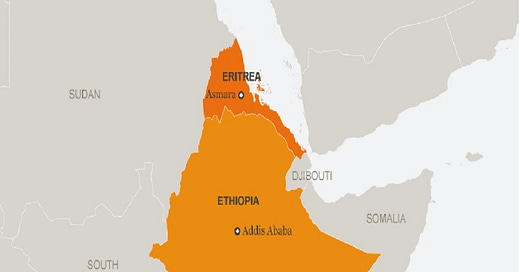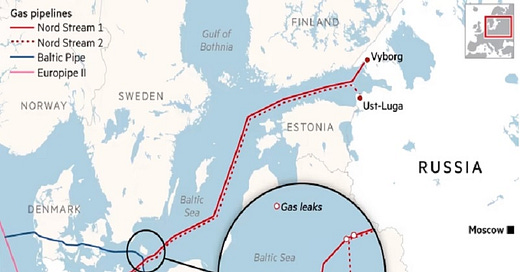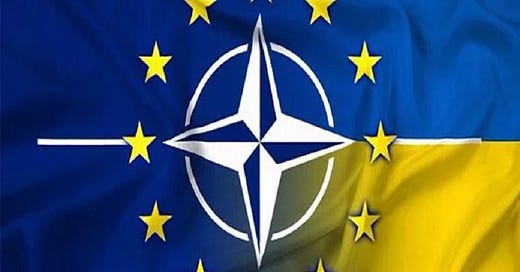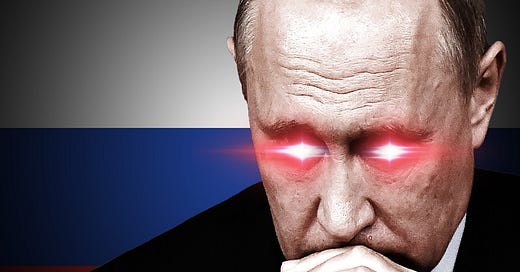
The purpose in drawing attention to these candid observations about the reason why mutual mistrust appears to have returned to Ethiopian-Eritrean ties is to understand its roots with a view towards improving or managing this state of affairs.
This month marked a full year since the Cessation Of Hostilities Agreement (COHA) ended Ethiopia’s two-year-long Northern Conflict between the federal government and the TPLF. Those who aren’t familiar with the COHA should review the following two analyses before proceeding with the present one:
* “Analyzing The Joint Statement From The Government Of Ethiopia & The TPLF”
* “Twelve Lessons To Be Learned From The Ethiopian Conflict”
Since then, Ethiopian-Eritrean ties have struggled to get back onto the track that Prime Minister (PM) Abiy Ahmed and President Isaias Afwerki (PIA) charted in summer 2018. Instead of continuing with their rapprochement, mutual mistrust appears to have returned.
This turn of events is likely attributable to the following three reasons:
* The Unexpected COHA Could Have Prompted PIA To Reconsider His Assessment Of PM Abiy
PIA might have thought that PM Abiy would fight their shared TPLF foes to the end, which is why the unexpected COHA could have prompted him to reconsider everything that he earlier assessed about his counterpart. If he viewed that agreement as a betrayal of sorts instead of as a pragmatic deal to end the violence and begin national rehabilitation, then PIA’s prior trust in PM Abiy might have been shattered, after which he could have begin to suspect other future forms of betrayal from his counterpart.
* Eritrea Might Be Reluctant To Withdraw From Tigray If PIA Began To Distrust PM Abiy’s Intentions
If PIA began to distrust PM Abiy like was argued above, then that could explain why the US recently alleged that Eritrean forces still remain in Tigray. They might still be there with Ethiopia’s approval, or it could be that they’re reluctant to withdraw due to concerns that the TPLF might re-emerge as a threat. Everything is admittedly speculative since both sides are mum on the issue, but if Eritrean forces are still there despite being asked by Ethiopia to leave, then that would have contributed to mutual mistrust.
* Ethiopia’s Red Sea Port Plans Could Have Unwittingly Worsened The Regional Security Dilemma
“It’s Not Controversial For Ethiopia To Negotiate For Its Own Port In A Neighboring Country”, but the way in which the issue was broached and some of the rhetoric that followed could have unwittingly worsened the regional security dilemma. Coastal and hinterland states sometimes view each other with suspicion, which is exacerbated in the Horn’s case due to clear asymmetries and historical legacies, so innocently raising this issue could have aggravated the growing mutual mistrust in those two’s ties.
These observations suggest that PIA’s arguably recalibrated assessment of PM Abiy is the main factor.
To be clear, PIA has the right to reassess whatever it may be for whatever reason, and nobody should doubt his patriotism since it’s been proven beyond doubt and everything he does is in pursuit of Eritrea’s national interests as he sincerely understands them to be. The purpose in drawing attention to this most candid of observations about the reason why mutual mistrust appears to have returned to Ethiopian-Eritrean ties is to understand its roots with a view towards improving or managing this state of affairs.
PM Abiy is committed to the COHA, which was identified as the initial reason why PIA began to distrust his intentions, so it’s unrealistic to expect him to rubbish that accord. As for the second factor regarding Eritrea’s reportedly continued military presence in Ethiopia, that’s a bilateral issue that can only be clarified by them informing the public about what’s really happening there and why. Concerning the third one, PM Abiy recently reaffirmed that Ethiopia will seek a Red Sea port through peaceful means.
These four analyses and the earlier hyperlinked one discuss the most realistic ways to achieve that goal:
* “What’s The Best Way For Ethiopia To Diversify From Its Dependence On The Port Of Djibouti?”
* “Russia Could Unlock Djibouti, Ethiopia, & South Sudan’s Combined Geo-Economic Potential”
* “How Could Russia Mediate A Series Of Deals Between Djibouti, Ethiopia, & South Sudan?”
* “A Deal With Djibouti Is The Best Of Ethiopia’s Three Diplomatic Options For A Red Sea Port”
Focusing on the Djiboutian dimension of this policy could help reduce Ethiopian-Eritrean suspicions.
Ethiopia’s civil society, scholars, media, and business communities could start a national discussion about the most mutually beneficial terms that their diplomats could offer Djibouti in exchange for a Red Sea port. That would help redirect popular discourse away from the unviable Eritrean option, thus reducing the threat perception that the latter’s public have about this and therefore responsibly managing their unwittingly worsened security dilemma that followed the return of mutual mistrust over the past year.
In that event, popular Eritrean discourse warning about Ethiopian aggression would either fade after the perceived threat is no longer lent the credibility that some interpret Ethiopian social media chatter about the Eritrean option as signaling, or those continuing to push such discourse would be discredited. Both outcomes would help the shared cause of responsibly managing the aforesaid challenges by eliminating divisive narratives and exposing those on both sides who have an agenda in perpetuating them.
Average folks in both countries can’t influence state-level policies aimed at improving or managing the present-day state of Ethiopian-Eritrean relations, which as argued in this piece has become characterized by mutual mistrust, but they can still play a positive role in trying to mitigate it through these means. Instead of trading blame over whether PIA or PM Abiy caused this, it’s best for everyone to simply acknowledge the status quo and do their part in responsibly managing it if they feel comfortable.
Conspiracy theories, insults, and warmongering will only impede their leaders’ efforts to improve ties.















